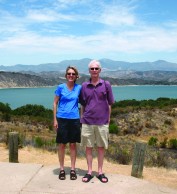STILLPOINT Archive: last updated 12/21/2009
Jim Rotholz '77
Back when the world was young—the mid 1970s to be precise—I was a rather typical student at Gordon. We were encouraged to employ our gifts and talents to serve a needy world. In addition, we wanted life beyond Gordon to be fun, exciting and adventurous—Who could blame us?
I was ill-prepared for what lay ahead. After years of what normally passes for success—starting a family, graduate degrees, and work overseas in missions and aid programs—the wheels started coming off. First my wife, Louise, became ill with chronic fatigue syndrome and still has not recovered some 18 years later. Then in 1996, soon after finishing a doctorate in anthropology, I too lost my health. I resigned a college teaching position and have done only occasional, piecemeal work since. That was 13 long years ago—in many ways the beginning of my real education.
I wrestled mightily with my plight while Louise’s uncomplaining, faithful life provided much inspiration. I began to understand that our American cultural definition of success was sadly out of whack. I had to learn how to succeed at failure.
I knew that Scripture defines success as faithfulness to God regardless of circumstances, and that I could be successful simply seeking to please God. But the daily struggle to live out that truth is the hard part. After 12 years I still shy from telling others I can’t work, can’t seem to get well, and live off my wife’s part-time job and the largess of the state.
Pride and ego die hard, and the journey of chronic illness often follows a lonely, forlorn path. But it provides valuable lessons on the human condition. Foremost is knowing that though I am disabled in body and mind, I can refuse disablement in spirit. I am free to choose my response to hardship.
The second lesson is to hold onto a sense of wholeness in Christ, no matter the outward limitations. A disabled person is a whole person, no less so than a star athlete, accomplished politician or acclaimed actor. To accept less is to affront the One Who made us all irrevocably equal in His sight.
The third lesson is to remember that the question is never Why me? but Why not me? Why? presumes a problem; Why not? presumes a purpose. I grew up, as most Americans, with a sense of entitlement to health, opportunity and choices. But given the circumstances of most of the world’s struggling poor, the question has to be Why not me?
The “not why, but why not” lesson spills into a fourth lesson: God, not the Devil, is in the details of every hardship, working in our darkest places, keeping hardship from being unbearable, pain from being pointless, and loss from having the final say. Family and friends have rallied behind me, including one faithful Gordon classmate in particular. That is God at work.
A final important lesson: Giving to others, however little one has to give, is liberating—and countercultural. Sometimes giving isn’t possible, and I accept those days. And when I do give it is often only minimal: helping a neighbor put up a wind chime or advising a friend who runs a nonprofit. But each time I do, the clouds lift a bit higher and my world grows a bit younger once again.
